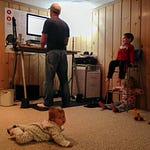
I recently had the opportunity to speak about the “father, elder, ruler” progression at a men’s breakfast. Afterwards, with tears in his eyes, an older man told me this:
“I used to be a leader in my career and in my home, but now that I’m retired and my kids are grown up, all I do is sit at home and care for the dog.”
Something in my heart broke for this man. I didn’t say it to him, but something in me wanted to say, “No! This is a tragedy! You’ve spent your life acquiring wisdom and your city desperately needs it. They don’t even know how much they need it. That’s why they’re not asking for it. And you have grandkids who desperately need your attention instead of a random day care employee.”
This is a great lie we’ve sold to Christian men: that the elder years are for withdrawal. For finally putting your feet up after decades of labor. For letting younger men take over while you fade into comfortable irrelevance.
The tears in this man’s eyes told me he longed for something different. He wanted a sense of meaning, purpose, and fulfillment in his latter years, but didn’t have a vision for what it could look like or, even if he did, how to change societal norms to get there. Cities don’t have gates for elders anymore.
As a 45-year-old father, I realize I’m speaking about something I have not yet experienced, but it seems to me that the grandfather years are essential to the health of a family and a city.
Here’s the modern vision I see for the elder years vs. what I think the Bible portrays.
Modern Vision: The Tragedy of Voluntary Exile
When a man reaches his sixties or seventies, he’s finally arrived at something our culture has trained him to abandon: the culmination of decades spent acquiring wisdom, navigating crises, building things, leading people, and failing enough times to recognize patterns that younger men can’t see yet. He’s paid for his education in the currency of mistakes, setbacks, victories, and long nights wrestling with problems that don’t have easy answers.
And then we tell him to go home and care for a dog while his aging body becomes a burden to the family.
The man who talked to me after that men’s breakfast had actually said something profound, though he didn’t mean it this way: he had become a leader in his career and home. Past tense. As if leadership was something you graduated from, like college or braces. As if wisdom had an expiration date.
But here’s what’s actually happening: his grandchildren are forming their understanding of manhood, marriage, work, and faith right now. His city is being shaped by whatever values its influential families have, without his influence. The next generation of men in his church are trying to navigate fatherhood and business and marriage without access to the forty years of pattern recognition sitting unused in his living room.
His retirement isn’t rest. It’s desertion. And it’s not his fault. This is what society expects.
Biblical Vision: The Elder Years Are Not for Spectating
Scripture doesn’t describe a stage of life where faithful men become spectators. The progression isn’t father to retiree. It’s father in the home, elder in the city, ruler in the Kingdom. And that third stage doesn’t begin when you die. It begins when you’ve proven faithful with the first two.
Remember Proverbs 31:23:
“Her husband is known in the gates when he sits among the elders of the land.”
This isn’t describing a young father. This is a man who has already led his household well, who now sits in the place of governance and wisdom. The gates were where disputes were settled, where guidance was sought, where the direction of the city was determined.
These weren’t honorary positions for guys who wanted to feel important. These were men whose families and businesses proved they could govern well—and their cities needed that capacity.
Or look at Titus 1, where Paul describes elder qualifications. These aren’t requirements for young men trying to prove themselves. They’re descriptions of men who have already managed their households well, whose children are believers, who have demonstrated self-control and wisdom over decades. The elder years aren’t the retirement party after fruitful governance — they’re the deployment of everything that fruitful governance built.
When a man becomes a grandfather, he hasn’t graduated from leadership. He’s (hopefully) finally qualified for its highest form.
In fact, the Jewish community holds the belief that if a word isn’t found in the Bible, then it’s a man-made word and isn’t a concept from God. Since the word nor the concept for “retirement” is found in scripture, many Torah-observing Jews have the idea that, until they die, they will always be generating value for their family and their community.
Personally, this makes sense to me. It doesn’t mean I’ll always be generating financial value or doing a young man’s work, but I’ll always be generating value for my family and city until I no longer can. In his book, “Thou Shall Prosper,” (affiliate) Rabbi Daniel Lapin describes it like a golf swing. A good swing doesn’t slow down when it reaches its goal of making contact with the ball (i.e., retirement). Instead, it follows through and keeps swinging even after the ball is on its way.
Now, I’m not saying every grandfather should pursue formal church eldership. That’s a specific office with specific responsibilities. But the qualifications for that office describe something broader: the kind of man whose life earns him natural authority. Whether you’re ever appointed as an elder or not, if you’ve managed your household faithfully, your family and community need the wisdom and influence that faithfulness has produced.
The challenge, of course, is that our cities don’t have literal gates anymore. There’s no cultural script for this today. You won’t receive a formal invitation to govern, which means the elder years require the humility to initiate where you’re not expected and the wisdom to discern which family is “fruitful soil” and is worth sowing into.

What Your Family Actually Needs
Your adult children need you.
They still need to watch you work on something difficult and not quit.
They still need to be reminded why integrity matters when no one is watching.
They still need to see you pray and actually mean it.
They still need to watch you love their mother well after fifty years when love isn’t always feelings anymore, it’s covenant.
And your grandchildren don’t need another daycare worker or another hour of screen time. They need access to you, too. They need you to teach them things from a biblical perspective:
How to think through problems
How to speak with respect
How to handle money
How to read Scripture like it actually matters.
Not because you’re trying to relive your glory days through them, but because formation happens through proximity to someone further down the road.
Your son or daughter is trying to raise these kids while navigating careers and mortgages and marriage. They’re drinking from a firehose every day. But you have time now. You have perspective. You have the leisure to invest in formation that their parents don’t always have bandwidth for.
And here’s what’s actually at stake: your grandchildren will either inherit your presence or your absence. They’ll either grow up with access to a man who shows them what biblical masculinity looks like across decades, or, if their father follows your lead and is also absent, they’ll piece together their understanding of manhood from YouTube, their peers, and whatever messages the culture happens to be selling that week.
The question isn’t whether they’ll be formed. The question is by whom.
Now, I realize there’s complexity in this. If your adult children have created distance, if they’re not eager for your involvement, that’s data worth listening to. The first work of eldership might be examining why that gap exists and whether you need to earn back trust before you can govern well. But don’t mistake complexity for impossibility. Strained relationships can be rebuilt, even if it takes years of effort (and even professional therapy) to get there.
Your City Doesn’t Know It Needs You
Part of governing your city means influencing its families, one family at a time, and right now families in your city are making big decisions:
Public school vs. Homeschool
Opening another credit card vs. Paying down the one they have
Staying in the same industry vs. Changing careers
Giving up on their marriage vs. sticking with it
Most of those families don’t have people consistently speaking into their lives. Sometimes it’s because they don’t have the maturity to open up and receive it, but other times it’s just because everyone else is “too busy” or “too humble” to help.
But you’re not too busy anymore.
And whether you realize it or not, you have something these families don’t: you’ve spent decades watching decisions play out over time. You’ve seen leadership fail and succeed. You’ve watched marriages come and go. You’ve managed people, budgets, conflicts, crises. You’ve acquired pattern recognition that takes a lifetime to build.
The families in your city need that.
Not because you’re smarter than everyone else, but because wisdom isn’t information—it’s the ability to see how things connect over time. The young finance guy sees the projected tax revenue from that new building development. You see what happened the last three times your city approved something similar. The activist pushing the new policy sees the immediate problem it solves. You see the future consequences they haven’t considered.
This is what elders do. They don’t just show up in people’s lives to feel important. They show up because their presence governs—it shapes what the future of the city looks like, one family at a time.
Ruling Starts Before the Kingdom Comes
Jesus told a parable in Luke 19 about a nobleman who gave his servants resources to manage while he was away. When he returned, he rewarded the faithful ones with authority:
“Well done, good servant! Because you have been faithful in very little, take charge over ten cities.”
The servants who managed the little well were given cities to rule. Not as a retirement bonus—as the natural deployment of proven capacity.
This is the trajectory Scripture describes for faithful men: current stewardship determines future authority. The man who governs his household well is qualified to govern the city. The man who governs the city well is being prepared to rule in the Kingdom.
Your grand-parenting years aren’t the end of this progression. They’re where it culminates.
The Work That Brings Meaning
So what does this actually look like?
It looks like blocking out regular time with each grandchild, not as babysitting favors to their parents, but as intentional formation. Teaching them to pray. Reading Scripture with them. Taking them on errands and narrating how you think through decisions. Inviting them into projects where they can learn skills and see work ethic modeled.
It looks like mentoring younger men in your church who are trying to navigate the same challenges you faced twenty years ago. The young father drowning in toddler chaos who needs to hear from someone who survived it. The entrepreneur making mistakes you already made. The couple considering divorce who needs perspective from someone whose marriage outlasted feelings.
It looks like using your time and resources to serve needs you can finally see because you’re not consumed by career climbing. The widow who needs help with her house. The single mom whose car keeps breaking down. The community project that needs someone with project management experience.
This isn’t about becoming a workaholic in your seventies. It’s about recognizing that the elder years are when you finally have the wisdom, time, and position to govern most effectively, and that your family and city desperately need you to do exactly that.
The Choice In Front of You
I think about the man who talked to me at the men’s breakfast. He didn’t realize he was describing a tragedy. He thought he was describing a normal retirement, but his tears told me he knew something was broken.
Our culture celebrates this kind of withdrawal. We call it “enjoying retirement” and “finally relaxing after years of hard work.” But biblical eldership doesn’t retire. It deploys.
So start small. Call one of your adult children this week, not to advise, just to build the relationship and catch up. Find one younger family in your church who seems hungry for input and invite them to dinner. Show up to one thing where younger fathers gather and make yourself available.
You won’t rebuild the gates overnight. But you can start sitting in them tomorrow.
And your dog, as much as he loves you, will never miss you the way your grandchildren will.










